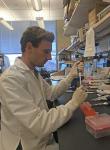Crowell, Preston

Preston is in the Cell and Developmental Biology home area of the MBIDP. He received a B.S. in Molecular, Cell, and Developmental Biology from UCLA, and stayed at UCLA, to work for his Ph.D. in the lab of Dr. Andrew Goldstein. He joined the CMB training program in 2018.
Mentor: Dr. Andrew Goldstein
Prostate cancer is one of the most commonly diagnosed cancers among males each year worldwide. Prostate cancer originates from the two lineages of prostate epithelial cells, basal and luminal. Basal and luminal cells are maintained by distinct progenitors. While both basal and luminal progenitors can give rise to basal and luminal cells in vitro, only basal progenitors display multipotency in vivo. Basal to luminal differentiation is observed during development, tissue repair, and inflammation. Furthermore, basal to luminal differentiation is hypothesized to be required for prostate cancer initiation from basal cells; however, the molecular mechanisms that regulate the plasticity of basal progenitor cells remain unknown. In addition, since little is known about the metabolism of the basal progenitors, it is unclear whether metabolic alterations help facilitate luminal differentiation.
To investigate how metabolic signaling contributes to basal to luminal differentiation, I am establishing metabolic signatures of basal and luminal primary cells using a variety of approaches including metabolic profiling, metabolic flux analysis using labeled tracer molecules, western blot, and RNA sequencing. To identify metabolic alterations associated with luminal differentiation, I am performing time-course experiments using these same approaches in an ex vivo system that recapitulates features of basal to luminal differentiation. The goal of my project is to identify the key metabolic alterations required for basal to luminal differentiation and determine how these alterations connect to changes in gene expression. Understanding metabolic regulation of basal to luminal differentiation could enable us to enhance luminal differentiation to facilitate tissue repair, or alternatively, interfere with luminal differentiation to prevent prostate cancer initiation from basal cells.


